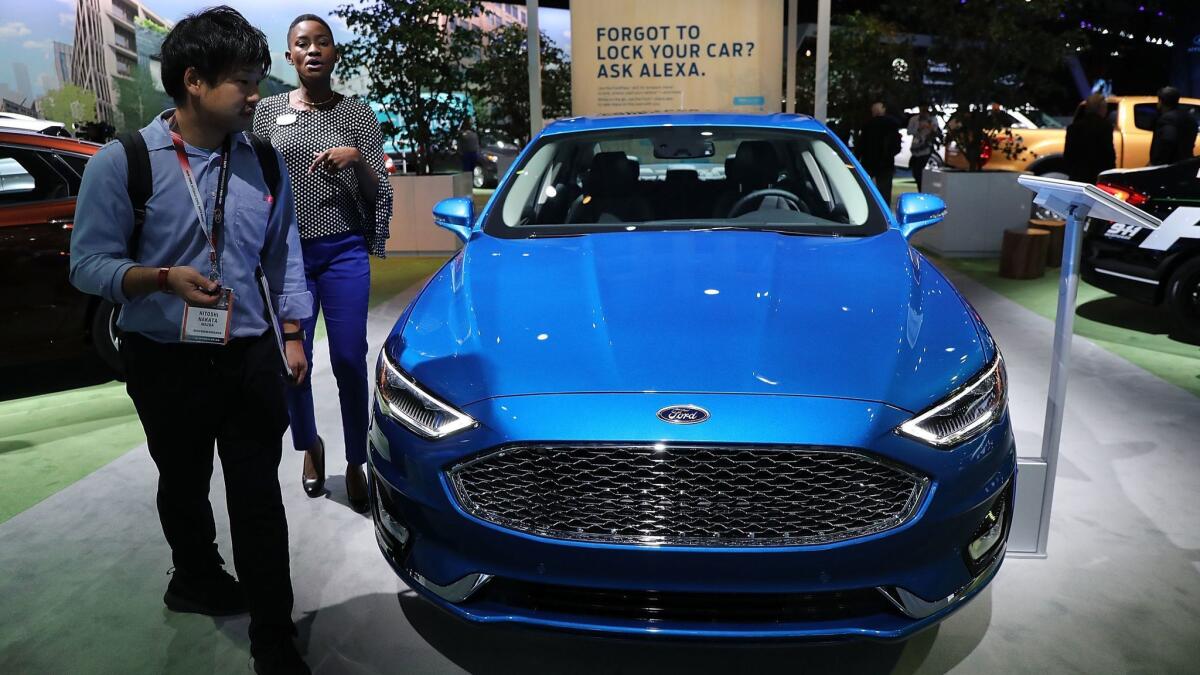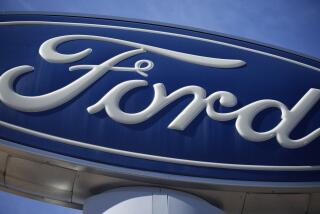Ford is saying so long to the likes of the Fusion and the Fiesta passenger cars

- Share via
Ford Motor Co. plans to cut several sedans, including the Fusion, Fiesta and Taurus, from its lineup to more quickly reach an elusive profit target.
By 2020, almost 90% of Ford’s portfolio in North America will be pickups, sport utility vehicles and commercial vehicles.
The cuts are aimed at kick-starting a turnaround effort almost one year after Ford’s board ousted its chief executive. New CEO Jim Hackett has been trying to convince investors that betting on a rebound is a worthwhile wager by laying out plans to get rid of slow-selling, low-margin car models and refocusing the company around more lucrative SUVs and trucks.
The automaker expects to save $25.5 billion by 2022, Chief Financial Officer Bob Shanks told reporters Wednesday as Ford reported first-quarter earnings per share and revenue that beat estimates.
“We’re going to feed the healthy part of our business and deal decisively with areas that destroy value,” Hackett said on an earnings call Wednesday. “We aren’t just exploring partnerships; we’ve now done them. We aren’t just talking about ideas; we’ve made decisions.”
Ford finds itself on a road similar to the route Fiat Chrysler Automobiles followed to pass Ford in North American profitability. Chief Executive Sergio Marchionne killed the Dodge Dart and Chrysler 200 to reorient Fiat Chrysler Automobiles around Jeep SUVs and Ram pickups.
General Motors, meanwhile, will end production of the Chevrolet Sonic subcompact as early as this year, the Wall Street Journal recently reported. GM is also considering discontinuing the Chevy Impala big sedan, the paper said. Cadillac plans to whittle down its sedan lineup to just three nameplates.
Ford reported first-quarter adjusted earnings of 43 cents a share, topping analysts’ average estimate of 41 cents. Automotive revenue rose to $39 billion, exceeding the average projection for $37.2 billion in a Bloomberg survey.
The company now anticipates reaching an 8% profit margin by 2020, two years ahead of schedule.
“Everything will be on the table” to fix Ford, Shanks told reporters in Dearborn, Mich., at the company’s headquarters. “We can make different investments, we can partner, we can exit products, markets — and we will do that.”
Ford said it won’t invest in new generations of sedans for the North American market, eventually reducing its car lineup to the Mustang and an all-new Focus Active crossover coming next year. The automaker conspicuously left the Lincoln Continental and MKZ sedans off its hit list, but since those models share mechanical foundations with Ford siblings, their futures also are in doubt.
In the 1990s, the Taurus was America’s bestselling car for five straight years. The Taurus name went away when Ford named its mid-size car the Fusion, but came back under former CEO Alan Mulally, who invested heavily in car models when gasoline was more expensive.
Going all in on SUVs and trucks got Detroit in trouble in the early 2000s, contributing to the 2009 government-backed bankruptcies of GM and Chrysler. Back then, choosing an SUV over a sedan meant significant compromise on fuel economy. When gas prices soared above $4 a gallon, Detroit’s shortsighted strategy was exposed and the American auto industry imploded.
These days, pump prices average about $2.50 a gallon. But cheap gas isn’t the only driver of the SUV boom: Today’s models bear little resemblance to the hulks of yore. Built on smooth-riding, lightweight car frames, many crossovers get fuel economy close to the equivalent cars.
“For Ford, doubling down on trucks and SUVs could be just what the brand needs,” Jessica Caldwell, an analyst for Edmunds.com, said in an email. “But this move isn’t without risk: Ford is willingly alienating its car owners and conceding market share.”
Investors had been growing impatient for additional detail on the money-losing models Ford would ditch — and for signs its reorganization efforts would bear fruit. Ford’s stock price rose as much 3.2% on Wednesday after the close of regular trading. Before the earnings report, the stock had dropped more than 11% this year.
“It’s not that the market has permanently given up on good news ever happening at Ford,” said David Whiston, an analyst with Morningstar Inc. who recently lowered his rating on the stock to the equivalent of a hold. “But most people aren’t expecting it until late 2019 or 2020, and that brings up the wild card of, ‘Will we be in a recession by then?’”
Hackett, 63, sought to assuage those concerns by promising “urgent” action.
“The hand-wringing that has been around in our business is gone,” he said. “We’re starting to understand what we need to do and are making clear decisions.”
More to Read
Inside the business of entertainment
The Wide Shot brings you news, analysis and insights on everything from streaming wars to production — and what it all means for the future.
You may occasionally receive promotional content from the Los Angeles Times.










